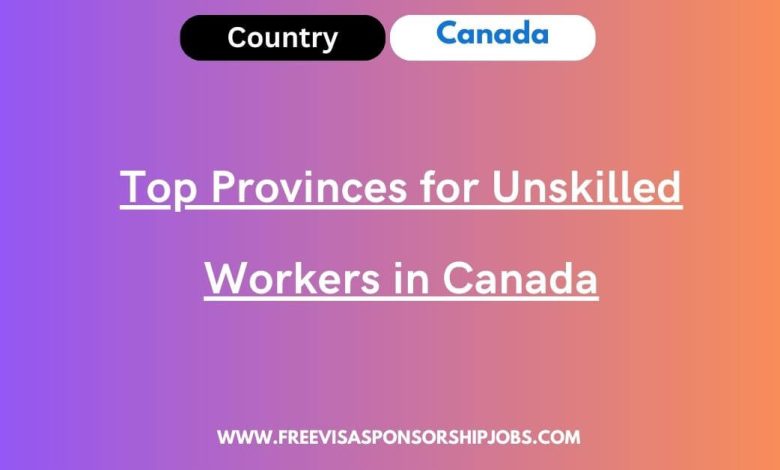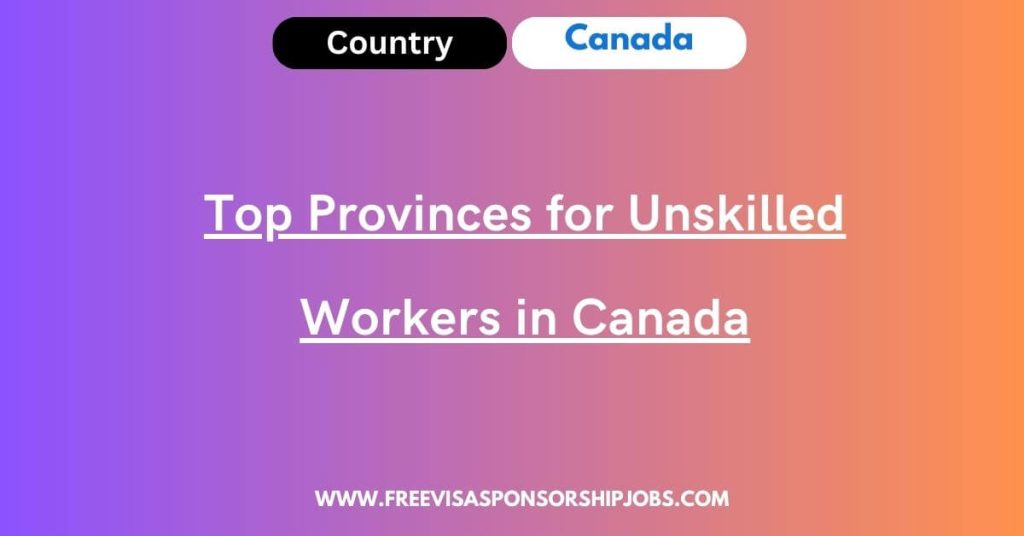Top Provinces for Unskilled Workers in Canada – Extrema Guide

Not every career necessitates the acquisition of a degree or its equivalent. Canada has a significant labor shortage for unqualified foreign nationals. This is only for you if you have no work experience or qualifications. If you are over the age of 18 and want to travel the world, keep reading to learn how to become an unskilled worker in Canada.
Introduction
Canada is known for having a lot of different job possibilities, and it welcomes unskilled workers to help its economy grow. Before getting into the details of each province, it’s important to understand how important it is to find the right place for unskilled work. Let’s take a trip through the best areas for people looking for low-skilled jobs.
Benefits of Unskilled Workers in Canada
- Prompt Employment: Generally, unskilled labor requires fewer qualifications for entry, which facilitates individuals’ ability to obtain employment rapidly. This can prove to be especially advantageous for individuals in need of immediate financial support.
- Point of Accessible Entry: These positions generally do not necessitate specialized knowledge or instruction, rendering them accessible to individuals lacking advanced degrees or particular certifications.
- An array of opportunities: A diverse array of sectors, such as retail, hospitality, agriculture, construction, and services, all provide unskilled labor. This diversity provides opportunities for individuals to receive exposure to a variety of industries and work environments.
- Adaptability: Numerous menial occupations provide the advantage of flexible work schedules, thereby facilitating individuals in managing their professional obligations alongside passions like education or familial duties.
- Educational Opportunities: Although these positions may not initially demand sophisticated skills, they frequently offer chances for practical training and the enhancement of existing abilities. Practical experience and transferable skills are both valuable assets that individuals can amass for their future endeavors.
- Engaging in networking: Unskilled labor offers prospects for industry-wide networking. Developing connections with clients, supervisors, and coworkers can facilitate career advancement and access to additional employment prospects.
- Maintaining Financial Stability: Uneducated labor can provide a means of attaining financial security for those who are new to the workforce or are in urgent need of cash. This is especially crucial to account for fundamental daily expenses.
- Employed Experience: Unskilled labor has an impact on a person’s overall employment experience. A consistent work history, including entry-level positions, can demonstrate dependability and a strong work ethic to prospective employers, thereby bolstering a resume.
- Opportunities for Progress: Certain menial positions provide avenues for career progression within the organization. Individuals who exhibit diligence and a solid professional code may qualify for promotions or acquire the necessary work experience to be considered for more specialized roles.
- Availability of jobs: The demand for unskilled labor is frequently greater, which improves the probability of securing employment. This is especially advantageous for individuals with limited work experience who are entering the job market.
- Approach to Professional Exploration: Unskilled labor can function as an intermediary position for those in the process of evaluating prospective professional trajectories. They afford the chance to evaluate one’s interests, strengths, and preferences before embarking on more specialized positions.
Top Provinces for Unskilled Workers in Canada
Here are five provinces with unskilled labor shortages. If you are concerned about the salary rate, Canada will put your mind at ease. The more experience you have in a job, even if you don’t have any qualifications, the more money you’ll make. In the long run, it’s simple to advance.
Saskatchewan
Saskatchewan is one of five jurisdictions that welcome unskilled workers and currently has approximately 12,000 unskilled job openings.
In Saskatchewan, the two most common forms of unskilled jobs are:
Transportation:
- Commercial truck drivers
- Logistics specialists
- Transit police
- Mechanics
Manufacturing:
- Extraction workers
- Oil refinery operators
- Mill workers
- Mining
British Columbia
In British Columbia, six large construction projects are currently underway. Some of these projects are the Trans Mountain Pipeline Expansion, the Broadway Subway Project, and the Site C Clean Energy Project, all of which have a strong demand for construction employees.
Currently, the two primary forms of unskilled jobs in British Columbia are:
Construction:
- Electronics installers
- Building inspectors
- Wood pattern makers
Service and hospitality:
- Dishwashers
- Service clerks
- Hotel night auditors
- Retail management
Ontario
Ontario now has 11,000 unskilled job openings, and the tourism industry is expanding, therefore hospitality is clearly a high-demand vocation. In Ontario, there are two basic types of unskilled jobs:
Transportation:
- Truck drivers
- Logistics specialists
- Transit police
- Railroad conductors
Service and hospitality:
- Dishwashers
- Service clerks
- Hotel night auditors
- Retail management

Manitoba
There are over 700 unskilled job openings. Cattle farms are one of the most common types of farms in Manitoba. They account for around 35.3 percent of the farming business. Grain and oilseed farms (25%) and wheat farms (9.8%) are the second most common, making agriculture a desirable career for unskilled employees.
In Manitoba, there are two basic types of unskilled jobs:
Agriculture
- General farm worker
- Greenhouse worker
- Gardener
- Organic farm worker
Manufacturing;
- Extraction workers
- Oil refinery operators
- Mill workers

Alberta
Oil and gas transportation in Alberta has been gradually increasing, making transportation vocations increasingly common.
In Alberta, there are two basic types of unskilled jobs:
Service and hospitality:
- Merchandisers
- Bouncers
- Technical support
- Ushers
Transportation:
- Commercial truck drivers
- Logistics specialists
- Transit police
- Railroad conductors
NOC Codes
NOC is an abbreviation for National Occupation Classification. This sort of classification is used by the government of Canada to determine the skill level associated with certain vocations. Based on your NOC level or skill type, any occupation is classed as skilled, low-skilled, or unskilled.
The level of training or education required by a certain occupation is referred to as the skill level. The broad area or industry in which your occupation falls is referred to as your skill type.
NOC Skill Levels
There are four NOC skill levels, which are labeled A, B, C, or D.
| Name | Description |
| A | These occupations require a degree and university-level education |
| B | These jobs require college-level education and apprenticeship training |
| C | These occupations require secondary school-level education with job-specific training |
| D | This type of work require only on-the-job training |
NOC Skill Type Categories
Skill type categories vary from 0 to 9, with a total of ten categories:
0 – Positions in management
1 – Administrative, commercial, and financial positions
2 – Jobs in applied science, natural science, and related fields
3 – Jobs in the medical field (nurses, doctors, etc.)
4 – Jobs in social services, government service, education, law, and community service
5 – Leisure vocations such as cultural, artistic, and sports-related jobs
6 – Jobs in customer service and sales
7 – Jobs in trading, equipment operation, and transportation
8 – Natural resource, agricultural, and manufacturing jobs
9 – Manufacturing and utility positions

5 Popular Immigration Programs
Here are five immigration programs that will assist you in immigrating to get your dream career in another country.
Read Also: Urgent Factory Worker Jobs in Canada with lmia – Apply Now
1. The Provincial Nominee Program (PNP)
If you already have a work offer and want to immigrate to Canada, this is the ideal option for you. In Canada, there are 11 Provincial Nomination Programs:
- Alberta Immigrant Nominee Program (AINP)
- British Columbia Provincial Nominee Program (BC PNP)
- Manitoba Provincial Nominee Program (MPNP)
- New Brunswick Provincial Nominee Program (NW PNP)
- Newfoundland & Labrador Provincial Nominee Program (NL PNP)
- Northwest Territories Nominee Program (NTNP)
- Nova Scotia Provincial Nominee Program (NS PNP)
- Ontario Provincial Nominee Program (OINP)
- Prince Edward Island Provincial Nominee Program (PEI PNP)
- Saskatchewan Provincial Nominee Program (SINP)
- Yukon Nominee Program (YNP)
2. The Rural And Northern Immigration Pilot
The Rural And Northern Immigration Pilot has brought together 11 communities and towns in Ontario, Manitoba, Saskatchewan, Alberta, and British Columbia to hire foreign labor. The essential prerequisite for this program is that you have a legitimate work offer from a Canadian business and are prepared to relocate to any of the five provinces listed.
3. The Atlantic Immigration Pilot
This experiment applies to four Atlantic provinces: Newfoundland and Labrador, Prince Edward Island, New Brunswick, and Nova Scotia. You must submit documentation of a legitimate employment offer as well as one year of work experience in the field to which you are applying.
4. Agri-Food Immigration Pilot
The Agri-Food Immigration Pilot began in 2020 in response to a labor shortfall in Canada’s agriculture sector. This experimental program would allow foreign workers to work in Canada’s agriculture and animal production industries. Language, money, and education are all required, but the key criterion is one year of non-seasonal experience in a job identical to the one you’re seeking for.
5. Temporary Foreign Worker Program (TFWP)
This program was designed to help Canadian firms hire foreign workers in a variety of occupations. A Canadian employer must produce documentation of a Labour Market Impact Assessment (LMIA) before hiring you. According to the LMIA, they were unable to identify a permanent resident to fill the role at hand. The foreign worker you hire must provide an LMIA number with their work permit application.
Conclusion
In conclusion, Canada’s best provinces for unskilled workers offer a wide range of chances, and each has its own benefits. From the economic powerhouse of Ontario to the natural beauty of British Columbia to the close-knit communities of New Brunswick, people who aren’t skilled can find satisfying jobs that fit their living choices. For a successful and satisfying experience, it’s important to make a choice based on your personal priorities and career goals.
Frequently Asked Questions:
-
Which Canadian province has the most job opportunities?
British Columbia will have the most job growth in Canada. It has had a 6.6% growth in employment.
-
Is it cheaper to live in Ontario or Nova Scotia?
I have lived in Nova Scotia for a period of time and can tell you that it is far less expensive than residing in Ontario. Although the cost of agriculture may be slightly greater, fish costs are minimal and housing is incredibly inexpensive.




